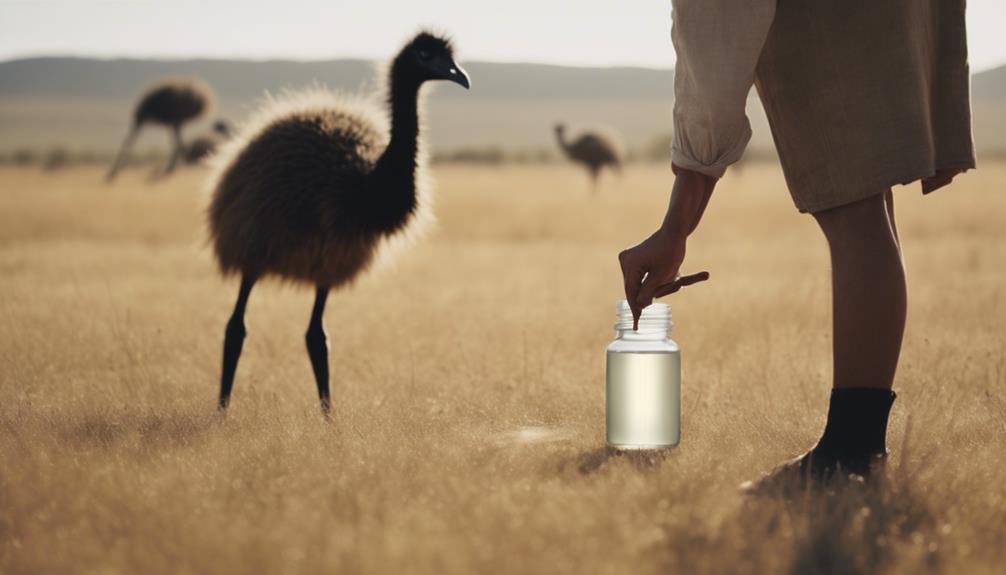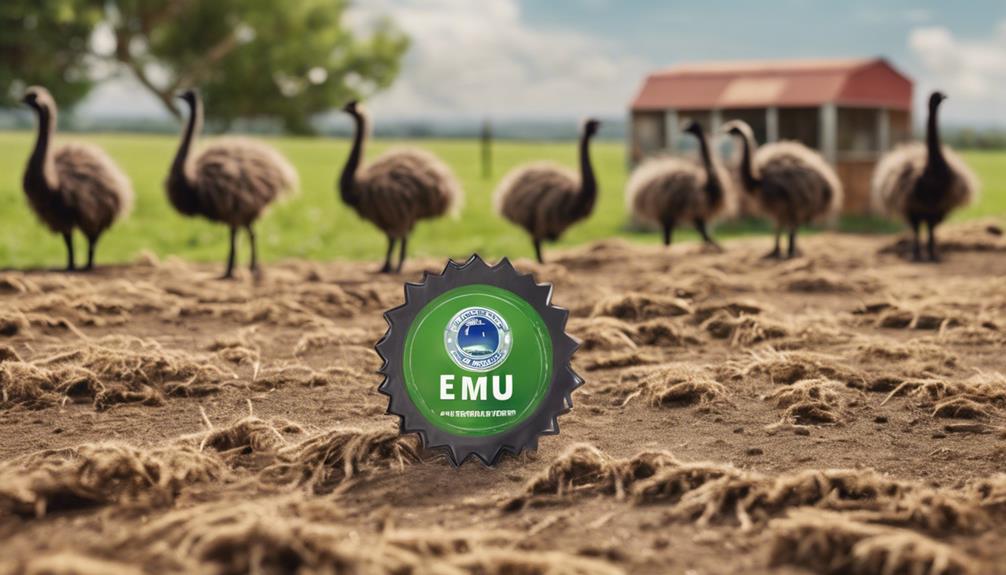
You might think consuming emu products is a simple choice, but the ethical implications run deeper than you realize. From the welfare of the emus to the sustainability of harvesting practices, there are numerous factors to consider.
Understanding the complexities of the industry and its impact on various stakeholders is essential in making informed decisions.
Stay tuned as we explore the multifaceted ethical considerations surrounding emu product consumption, shedding light on crucial aspects that often go unnoticed.
Key Takeaways
- Responsible breeding and high welfare standards ensure ethical emu product consumption.
- Indigenous perspectives and cultural significance must guide ethical sourcing practices.
- Sustainable harvesting and land management are vital for ethical emu product consumption.
- Certification programs and transparency enhance accountability in emu product sourcing.
Emu Farming Practices

When considering the ethical implications of emu product consumption, it's crucial to closely examine the farming practices employed in the industry. The breeding practices and animal welfare standards within the emu farming sector play a significant role in determining the ethical nature of emu product consumption. Responsible breeding practices ensure the health and genetic diversity of emus, while also preventing issues associated with inbreeding. Moreover, high standards of animal welfare guarantee that emus are treated ethically and with respect throughout their lives.
In addition to breeding practices and animal welfare, land management and sustainability are key aspects to evaluate. Sustainable land management practices are essential for preserving the natural habitats of emus and minimizing the environmental impact of emu farming operations. Emu farms that prioritize sustainability contribute positively to biodiversity conservation and ecosystem health, aligning with ethical considerations regarding environmental stewardship.
Animal Welfare Concerns
Have animal welfare concerns in emu farming practices been adequately addressed to meet ethical standards? While some progress has been made in addressing animal welfare in emu farming, there are still significant concerns that need to be carefully considered:
- Animal Welfare: Emus are sensitive creatures that require specific care and living conditions to thrive. Concerns arise regarding the housing conditions, handling practices, and overall welfare of emus in captivity.
- Conservation Efforts: Emus are native to Australia and play a crucial role in the ecosystem. Ethical sourcing of emu products should also consider the impact on wild emu populations and how farming practices may affect conservation efforts.
- Ethical Sourcing and Wildlife Protection: It's essential to ensure that emu farming practices don't contribute to the exploitation or endangerment of wild emu populations. Wildlife protection should be a core consideration in the sourcing and production of emu products to uphold ethical standards and promote sustainability.
Indigenous Perspectives on Emus

Emu farming practices must also consider the rich Indigenous perspectives on the significance of emus in traditional culture and the implications for ethical sourcing and conservation efforts. Emus hold a profound cultural significance for many Indigenous communities, symbolizing spirituality, survival, and connection to the land. Understanding and respecting these perspectives is crucial for ensuring ethical practices in emu farming and product consumption.
From an Indigenous viewpoint, emus aren't merely a commodity but a vital part of their cultural identity and heritage. The ethical sourcing of emu products must align with these perspectives, acknowledging the spiritual and traditional values attached to these magnificent birds. Conservation efforts shouldn't only focus on sustainable practices but also incorporate Indigenous knowledge and wisdom to ensure the long-term well-being of emu populations.
Sustainable Harvesting Methods
Opt for a sustainable approach to harvesting methods to ensure the longevity and ethicality of emu product sourcing. Sustainable harvesting methods are crucial for the well-being of emu populations and the ecosystems they inhabit. By adopting practices that prioritize wildlife conservation and biodiversity preservation, you can make a positive impact on the environment and contribute to the ethical sourcing of emu products.
Key Points:
- Regenerative Agriculture: Embrace regenerative farming practices that mimic natural ecosystems, promoting soil health, vegetation growth, and overall ecosystem resilience. This approach not only benefits emus but also supports a thriving habitat for a variety of species, enhancing biodiversity preservation.
- Population Monitoring: Implement regular monitoring programs to track emu populations and ensure that harvesting practices are sustainable and don't jeopardize the long-term viability of these majestic birds. This proactive measure is essential for effective wildlife conservation efforts.
- Community Engagement: Engage with local communities, indigenous groups, and conservation organizations to develop sustainable harvesting plans collaboratively. By fostering partnerships and incorporating diverse perspectives, you can create a holistic approach that prioritizes both emu well-being and ecosystem health.
Ethical Considerations for Emu Oil

To ensure the ethical sourcing and consumption of emu oil, it is imperative to examine the practices involved in its production and the impact on both emu populations and their ecosystems. Emu oil is obtained from the fat of emus through a process known as rendering, which raises concerns about the welfare of these birds. Additionally, the environmental impact of emu farming for oil production must be scrutinized to assess its sustainability and potential harm to ecosystems.
| Ethical Considerations for Emu Oil | ||
|---|---|---|
| Challenges | Implications | Recommendations |
| Emu welfare during rendering | Risk to emu populations | Ensure humane practices |
| Environmental impact of farming | Ecosystem disruption | Support sustainable practices |
It is crucial to prioritize the ethical sourcing of emu oil by supporting producers that adhere to humane practices and sustainable farming methods. By being mindful of the environmental impact and the welfare of emus, consumers can make informed decisions that align with their values and promote responsible consumption practices.
Consumer Awareness and Responsibility
Consumers must proactively educate themselves on the ethical considerations surrounding emu product consumption to make informed choices aligned with sustainable practices and animal welfare. In a market flooded with various emu-derived products, understanding the implications of your purchases is crucial. Here are three key points to consider:
- Ethical Sourcing: Investigate the origins of the emu products you buy. Look for companies that prioritize humane treatment of emus, ensuring they're raised in ethical conditions.
- Environmental Impact: Be mindful of the environmental consequences of emu farming. Consider the land use, water consumption, and overall sustainability practices of the brands you support.
- Ethical Labeling: Pay attention to labels and certifications. Seek out products that are transparent about their production processes and adhere to ethical standards. This can help you support businesses that prioritize both animal welfare and environmental conservation.
Emu Leather Industry Ethics

Investigate the ethical implications of emu leather production to gain insight into the industry's adherence to humane practices and sustainability standards. When it comes to emu leather sourcing, sustainability is a key concern. Examining the labor rights and transparency in emu leather production is crucial for understanding the ethical landscape of this industry.
| Ethical Aspect | Description | Importance |
|---|---|---|
| Emu Leather Sourcing | Understanding where the leather comes from | Ensures ethical practices |
| Sustainability | Examining the impact on the environment | Promotes eco-friendly choices |
| Labor Rights | Ensuring fair treatment of workers | Upholding human dignity |
| Transparency in Production | Openness in the production process | Builds trust with consumers |
| Adherence to Standards | Compliance with ethical guidelines | Reflects industry values |
Environmental Impact of Emu Farming
Ponder the ecological ramifications of emu farming practices on the surrounding environment, shedding light on the sustainability challenges faced by this industry. When considering the environmental impact of emu farming, several critical aspects come into play:
- Carbon Footprint: Emu farming operations often require extensive land use and energy consumption, contributing to a significant carbon footprint. The transportation of emu products and feed production are also factors that add to this footprint.
- Water Usage: Emus require significant amounts of water for hydration and cleaning. The high water demand of emu farming can strain local water resources, especially in regions prone to drought. Sustainable water management practices are crucial to mitigate this impact.
- Land Management: Emu farming necessitates appropriate land management strategies to prevent overgrazing and habitat destruction. Conservation efforts should focus on maintaining biodiversity and ecosystem balance within the farming areas to ensure the long-term sustainability of the environment.
Understanding and addressing these environmental challenges is essential for the responsible development of the emu farming industry.
The Role of Certification Programs

Examining the efficacy of certification programs in regulating and promoting ethical standards within the emu farming industry is crucial for ensuring transparency and accountability. Certification standards play a pivotal role in building consumer trust by verifying that emu products are sourced ethically and sustainably. These programs set guidelines that farms must adhere to, ensuring industry accountability and responsible practices. However, the effectiveness of certification programs can vary, with some offering more rigorous standards than others. It's essential for consumers to research the credibility and thoroughness of the certifications present on emu products to make informed decisions.
While certification programs can provide a level of assurance regarding ethical sourcing, they aren't foolproof. Some certifications may lack stringent criteria or rigorous monitoring, leading to potential loopholes in ensuring ethical practices. Therefore, it's imperative for consumers to critically evaluate the certifications endorsed on emu products to truly support ethical and sustainable farming practices.
Cultural Sensitivity in Emu Product Use
Ensuring cultural sensitivity in the utilization of emu products involves acknowledging and respecting the historical significance and traditional practices associated with their use. It's imperative to approach the consumption of emu products with a deep understanding of the cultural contexts from which they originate. Here are three essential considerations to uphold cultural sensitivity and ethical sourcing:
- Avoiding Cultural Appropriation: When incorporating emu products into your lifestyle or business, it's crucial to ensure that you aren't appropriating Indigenous cultures. Respect the knowledge and traditions of the communities that have long utilized emu products and seek their guidance on proper usage.
- Supporting Ethical Sourcing: To demonstrate cultural sensitivity, prioritize purchasing emu products from sources that uphold ethical practices. This includes ensuring fair treatment of emus, respecting Indigenous rights, and supporting sustainable harvesting methods.
- Promoting Cultural Exchange: Instead of merely consuming emu products, consider engaging in meaningful cultural exchange. Take the time to learn about the significance of these products to Indigenous communities and actively support initiatives that promote cultural preservation and understanding.
Transparency in the Supply Chain

Maintaining transparency in the supply chain is essential for ensuring ethical sourcing practices in the utilization of emu products. When companies prioritize supply chain transparency, they demonstrate a commitment to ethical sourcing, which fosters consumer trust and supports sustainable practices. By allowing consumers to trace the journey of emu products from farm to shelf, companies not only uphold ethical standards but also empower individuals to make informed choices aligned with their values.
| Benefits of Supply Chain Transparency | Challenges of Ensuring Ethical Sourcing |
|---|---|
| – Builds consumer trust | – Monitoring multiple suppliers |
| – Promotes sustainable practices | – Ensuring compliance with ethical standards |
| – Enhances brand reputation | – Balancing cost considerations |
| – Encourages accountability | – Addressing potential supply chain disruptions |
| – Supports fair labor practices | – Managing information flow effectively |
Emphasizing transparency in the supply chain is not just a trend but a necessity in today's conscientious consumer landscape. Companies that prioritize ethical sourcing through transparent supply chains not only meet consumer expectations but also contribute to a more sustainable and responsible industry.
Ethical Alternatives to Emu Products
Exploring ethical substitutes for emu products presents an opportunity to align consumption choices with values of animal welfare and sustainability. When considering alternatives, it's crucial to prioritize products that not only uphold ethical standards but also promote environmental conservation and fair trade practices.
Here are three key considerations for finding ethical alternatives to emu products:
- Vegan Alternatives: Opting for vegan alternatives such as plant-based oils and lotions can provide similar benefits for the skin without the ethical concerns associated with emu oil production. By choosing vegan options, you actively support cruelty-free practices and contribute to a more compassionate beauty industry.
- Ethical Sourcing: Look for products that prioritize ethical sourcing practices, ensuring that ingredients are sourced sustainably and without harming wildlife. By supporting brands that prioritize ethical sourcing, you can make a positive impact on both animal welfare and environmental conservation efforts.
- Environmental Impact and Fair Trade: Consider the environmental impact of the products you choose and opt for items that are produced using eco-friendly practices. Additionally, prioritize products that support fair trade initiatives to ensure that workers are treated ethically and compensated fairly for their labor. By making conscious consumption choices, you can advocate for a more ethical and sustainable future.
Frequently Asked Questions
Can Emu Products Be Safely Used by Individuals With Allergies to Other Animal Products?
If you have allergies to animal products, using emu products can be risky due to potential cross-reactivity with emu proteins. Consider alternative products for allergy management to avoid issues and ensure your safety.
Are There Any Potential Health Risks Associated With Consuming Emu Meat or Using Emu Oil?
When it comes to potential health risks with emu meat or oil, be cautious. Check for allergies and consult a healthcare provider. Emu meat offers nutritional benefits, and using proper cooking methods ensures safety.
How Do Emu Farming Practices Compare to Those of Other Livestock Industries in Terms of Environmental Impact?
In the world of farming, emu practices stand as a symbol of sustainability. Their resource-efficient methods showcase a commitment to reducing environmental impact. Embrace the lessons they offer in balancing productivity with responsible stewardship of our planet.
Are There Any Regulations in Place to Ensure the Humane Treatment of Emus During the Harvesting Process?
When it comes to the humane treatment of emus during harvesting, it's crucial to uphold ethical standards and prioritize animal welfare. Regulations should be in place to ensure that these creatures are treated with care and respect.
What Is the Carbon Footprint of the Emu Farming Industry Compared to Other Animal Agriculture Industries?
When considering the carbon footprint of the emu farming industry compared to other animal agriculture sectors, it's essential to focus on resource usage and emissions. Understanding the environmental impact can lead to more sustainable practices.
Conclusion
You may argue that the demand for emu products is too high to consider ethical concerns. However, imagine a world where sustainability and respect for indigenous traditions guide our choices.
Picture a future where transparency in the supply chain ensures that every emu product you use has been ethically sourced. By supporting ethical alternatives, you can be part of a movement towards a more responsible and conscious consumer culture.




